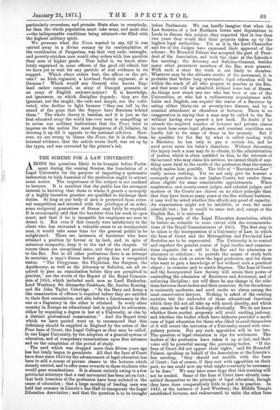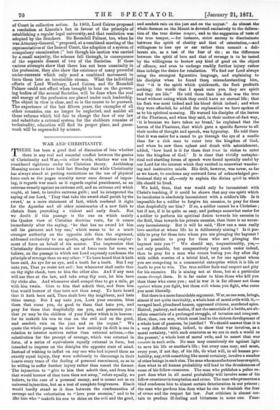THE SCHEME FOR A LAW UNIVERSITY.
AMONG the questions likely to be brought before Parlia- ment during the coming Session, the foundation of a Legal University for the purpose of imparting a systematic instruction to both branches of the profession ought to attract some notice. The importance of the subject is not confined to lawyers. It is manifest that the public has the strongest interest in knowing that those to whom it grants a monopoly of a highly lucrative practice are qualified to discharge their duties. So long as any body of men is protected from exter- nal competition and invested with the privileges of an order, some reciprocal guarantees of fitness may fairly be required. It is occasionally said that the barrister does his work in open court, and that if he is incapable his employers are sure to detect it. But even if this remedy were satisfactory to the client who has entrusted a valuable cause to an incompetent man, it would take some time for the general public to be enlightened. There are instances of banisters who have attained a position by favour or by luck, and, in spite of notorious incapacity, keep it to the end of the chapter. Of course these are exceptional cases, and they are not peculiar to the Bar. Bat in all other professions there is an attempt to ascertain a man's fitness before giving him a recognized status. " The Clergyman, the Physician, the Surgeon, the Apothecary, as well as the Attorney or Solicitor, are all re- quired to pass an examination before they are permitted to practise," are the words of the Report of the Royal Commis- sion of 1855, which included such men as Lord Hatherley, Lord Westbury, Sir Alexander Cockburn, Mr. Justice Keating, and Sir John Taylor Coleridge. "In the Navy and Army a like examination of officers is required before they are entitled to their first commission, and also before a Lieutenancy in the one or a Captaincy in the other is attained. In every other country in Europe an educational test is applied to advocates, either by requiring a degree in law at a University, or else by a distinct professional examination." And the Report from which we have quoted went on to recommend that this deficiency should be supplied in England by the union of the Four Inns of Court, the Legal Colleges as they may be called, in one Legal University, by the adoption of a general system of education, and of compulsory examinations upon first entrance and on the completion of the period of study. The seed which was dropped more than fifteen years ago has but lately begun to germinate. All that the Inns of Court have done since 1855 for the advancement of legal education has been to add a course of private classes to the lectures which already existed, and to offer some rewards to those students who would pass examinations. It is almost entirely owing to a few provincial attorneys that a real movement has been set on foot ; that both branches of the profession have been enlisted in the cause of education ; that a large meeting of leading men was held last summer in Lincoln's Inn Hall to inaugurate the Legal Education Association ; and that the question is to be brought before Parliament. We can hardly imagine that when the Law Societies of a few Northern towns sent deputations to Leeds to discuss this subject, they expected that in less than two years they would find their projects taken up by the highest legal authorities. Yet as it is, the Lord Chancellor and ten of the Judges have expressed their approval of the• scheme ; Sir Roundel]. Palmer has accepted the post of Presi- dent of the Association, and took the chair at the Lincoln's• Inn meeting ; the Attorney and Solicitor-General, besides many other prominent members of the Bar, were present. With each a start the work is not likely to slumber. Whatever may be the ultimate results of the movement, it is • probable that before long systematic legal education will be within the reach of all who propose to practise at the Bar, and that none will be admitted without some test of fitness. As things now stand, any one who has been at one of the Universities, or who has a rudimentary acquaintance with Latin and English, can acquire the status of a Barrister by eating either thirty-six or seventy-two dinners, and by &- nominal attendance at chambers or lectures. There is no- exaggeration in saying that a man may be called to the Bar without having ever opened a law book. No doubt if he attends the required number of lectures and private classes he must hear some legal phrases, and constant repetition can hardly fail to fix some of them in his memory. But if he qualifies for the Bar by what is called reading with a Barrister, he has only to pay a certain fee, and he need never enter his tutor's chambers. Without discussing the injury such a man may do to clients, to the administration - of justice, which is often confided to him, to the interests of the accused who may claim his services, we cannot think of any- thing more fatal to the credit of the profession than the system which makes him possible. The title of "Barrister-at-Law " really means nothing, Yet we not only give its bearers a monopoly of practice in our higher Courts, but render them alone eligible for some considerable appointments. When magistrates, and county-court judges, and colonial judges, and masters of the Courts are chosen on no other principle than that they have been so many years at the Bar without business, . it may well be asked whether this affords any proof of capacity. An examination might not be infallible, or even the most scientific test ; but it would be some test, and, except at the English Bar, it is universal.
The proposals of the Legal Education Association, which lie before us, coincide to some extent with the recommenda- tions of the Royal Commissioners of 1855. The first step to be taken is the incorporation of a University of Law, in which the Inns of Court and the Metropolitan and Provincial Law Societies are to be represented. The University is to control and regulate the general course of legal studies and examina- tions requisite for a call to the Bar and for admission as attorneys or solicitors ; to provide the means of study both. for those who wish to enter the legal profession, and for those who want to gain a knowledge of law without such a practical object ; to examine and to confer Degrees. The Inns of Court and the Incorporated Law Society will retain their power of controlling the admission of Barristers and Attorneys, and of enforcing discipline ; nor will there be any change in the rela- tions between these bodies and their members. So far the scheme is eminently moderate, and need excite no alarm among the most conservative lawyers. Nothing is asked of the existing societies bat the surrender of those educational functions which they did not all take up with much alacrity, and which they cannot be said to discharge effectually. We do not know whether these modest proposals will avoid exciting jealousy, and whether the bodies which have hitherto provided a modi- cum of legal education for those who liked to avail themselves of it will resent the intrusion of a University armed with com- pulsory powers. But any such opposition will be too late. The question of legal education is ripe for settlement. The leaders of the profession have taken it up at last, and their voice will be powerful among the governing bodies. "If the Inns of Court did not oppose their rights," said Sir Bounden Palmer, speaking on behalf of the Association at the Lincoln's Inn meeting, "they should not meddle with the Inns of Court ; but of course, if they met with opposition on their part, no one could now say what might eventually be necessary to be done." We may have some hope that this warning will not be needed. Some of the Inns of Court have already com- mitted themselves to the principle of legal education, though they have done comparatively little to put it in practice. In 1845, at the instance of Lord Westbury, the Middle Temple established lectures, and endeavoured to unite the other Inns of Court in collective action. In 1863, Lord. Cairns proposed a resolution at Lincoln's Inn in favour of the principle of establishing a regular legal university, and that resolution was adopted by the Benchers. Sir Boundell Palmer, too, when he was Attorney-General, " proposed, at a combined meeting of the representatives of the Inns of Court, the adoption of a system of compulsory examination ;" but though his motion was carried by a small majority, the scheme fell through, in consequence of the separate dissent of two of the Societies. If these various attempts show that there has not been unanimity in the profession, they also show the existence of many powerful under-currents which only need a combined movement to form them into an irresistible stream. What the individual efforts of Lord Westbury, Lord Cairns, and Sir Roundel]. Palmer could not effect when brought to bear on the govern- ing bodies of the several Societies, will be done when the zeal and energy of the profession are placed under such leadership. The object in view is clear, and so is the course to be pursued. The experience of the last fifteen years, the examples of all other countries, can no longer be neglected, and amidst all those reforms which bid fair to change the face of our law and substitute a rational system for the stubborn remains of technicality, education will find its proper place, and guess- work will be superseded by science.































 Previous page
Previous page